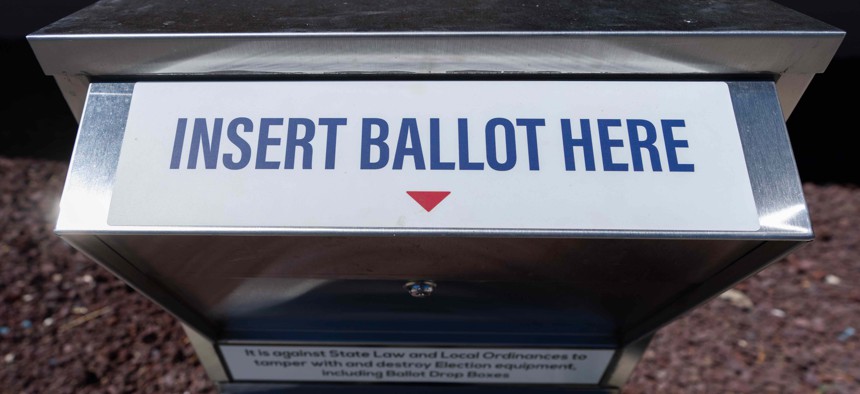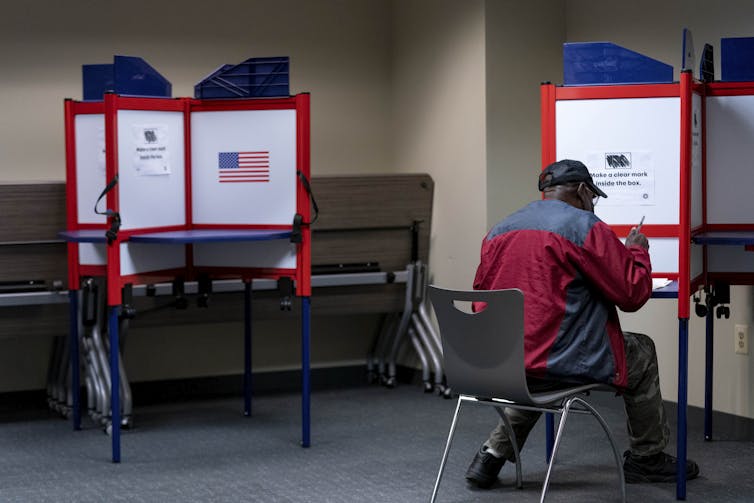The Important Role Played by Secretaries of State in Administering Fair Elections is Changing

Bill Clark/CQ-Roll Call, Inc via Getty Images

Connecting state and local government leaders
COMMENTARY | And not in a good way.
The state officials who administer fair, accessible and secure elections have historically operated quietly without garnering much public attention. Elections happen, votes are counted, the winners are declared and democracy moves on.
But since 2020, secretaries of state and other state officials who oversee elections have come under increasing scrutiny and been exposed to increasing abuse.
Studies have shown both state Democratic and Republican chief election officials oversee elections with similar partisan outcomes, turnout rates and administrative policies. And despite the fact that most of these officers are selected through explicitly partisan processes, the majority of them behaved in a nonpartisan manner to ensure fair and secure elections.
But given the increasingly polarized and hostile political environment in the U.S., is the country about to experience an Election Day filled with conflict, contested election results and chief election officials who are no longer trusted?

What They Do
The decentralized U.S. election system is run by state and local officials. State chief election officials, the title most often given to the top official in the system, have ultimate authority over elections in the state and oversee voting processes before, during and after an election.
There is a good deal of variation on how chief election officers are selected in each of the states. Most are selected through explicitly partisan processes, such as partisan elections or political appointment by a legislature or governor.
The responsibilities of these election officials include ensuring state and federal election laws are followed by local officials, implementing state plans to register eligible people to vote and maintaining the state voter registration database.
Additionally, they are responsible for training local officials to run elections and providing a process for testing and certifying voting equipment in the state.
Most of these chief election officers also have other important roles in state government. They may be responsible for administering business filings and licensing in a state and enforcing campaign finance regulations. They may also occupy a highly political role, as a successor to the governor.
How the System Works
Election certification, the official tallied results of in-person and absentee votes, has many steps and includes a number of post-election activities.
The first steps of election certification take place on the local level, and then the state level. The U.S. has over 10,000 local election administration jurisdictions. It is the officials in these local jurisdictions who handle the day-to-day operations of elections where votes are initially counted.
After the polls close, local election officials are responsible for counting ballots. This includes mail-in and absentee ballots, which in some states can be accepted days after Election Day if postmarked beforehand.
Officials then process provisional ballots. Provisional ballots are those cast by voters who arrive at the polls on Election Day and whose eligibility to vote is uncertain.
Next, officials conduct what’s called a canvass. That’s the tabulating, double-checking and transmitting of the results from the local jurisdiction to the state.
The certification finalizes the results based on the canvass.
While the exact procedures vary by state, a state canvassing board, chief election official or a small group that might include the governor and other state officials signs a certificate of election for all the candidates and ballot measures.

Undermining a Trusted Process
I’m a scholar of public-sector governance and a former local government official. I believe there are some disturbing signs emerging related to our highly partisan election administration system that could erode the public’s confidence in the neutrality of elections.
In our new book, “The Independent Voter,” my co-authors Jacqueline Salit and Omar Ali and I identify a series of vulnerabilities in this partisan system.
Overall mistrust in the neutrality of the election process is high, and voters are losing trust in U.S. elections. Claims that the 2020 election was fraudulent have been repeatedly disproved through exhaustive audits, recounts, reports and reviews. Yet despite this fact, consistently about 70% of Republican voters suspect election fraud.
This has led some states to alter the role of the chief election official. Some states have passed legislation that has shifted aspects of election administration to partisan bodies such as state legislatures or partisan-dominated election boards. When responsibility for an aspect of an election is changed in this way, it can intensify partisan gamesmanship, which in turn further erodes public trust.
Further affecting their reputation for neutrality, from 2000 to 2020 almost 30% of state chief election officers publicly endorsed a candidate running in a race under their supervision.
Additionally, in the upcoming 2022 midterms, chief election officer candidates in three swing states – Arizona, Michigan and Nevada – are running as election deniers.
Their platforms include eliminating mail voting, ballot drop boxes and even the use of electronic voting machines while giving power to partisan election observers and expanding their roles. Voting by mail makes voting more accessible to large groups of individuals and reduces the cost of elections. Eliminating the practice can make it harder for certain groups of people to vote. Expanding the role of partisan election observers can lead to voting intimidation.
Secretaries of state or chief election officers can’t single-handedly change an election’s results, but they can certainly undermine this system on a number of fronts.
They can refuse to certify the results of an election, triggering involvement of the governor or courts. They can also allow multiple audits by internal and external entities of election results and foster overall distrust in the election process and its outcomes by making public comments about the election’s results that signal the public shouldn’t trust the outcome of the election.
Disruption from the Outside
Chief election officers are also being confronted with extreme partisan groups seeking to disrupt and exploit the system of election administration before, during and after election. This includes endless post-election challenges to the veracity of election results.
During elections, problems can be expected as extreme partisan groups have moved to assign supporters, poll workers and observers to disrupt voting centers, tamper with equipment or call voting procedures into question, as Trump loyalist Steve Bannon has encouraged. And even before Election Day, chief election officials are seeing a coordinated campaign of requests for 2020 voting records, in some cases paralyzing preparations for the midterm election season.
The changing nature, role and perception of state chief election officials is damaging their ability to administer fair elections. The end result: Democracy is weakened in the U.S.
![]()
This article is republished from The Conversation under a Creative Commons license. Read the original article.
Thom Reilly is a professor and co-director of the Center for an Independent and Sustainable Democracy at the School of Public Affairs at Arizona State University.
NEXT STORY: Low-Income Renters to Receive Hundreds in Extra Aid Each Month


